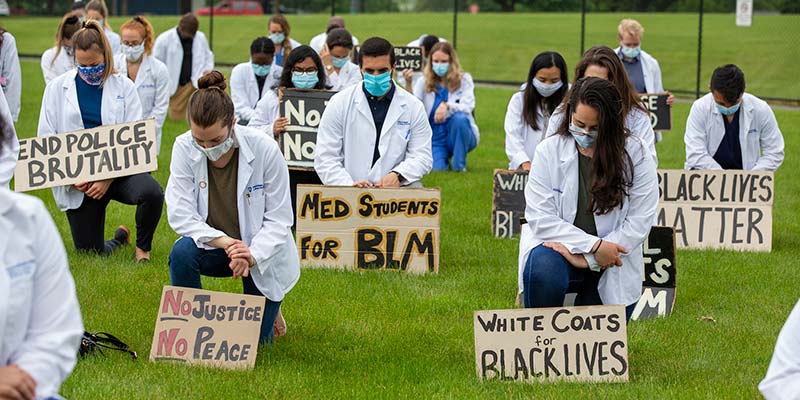Inclusion
We are committed to mitigating the impact of unconscious bias on patient care, eradicating micro-aggressions in the workplace, and being mindful of how our decisions affect vulnerable and underrepresented populations.
For employees and patients, this means creating mutual respect between employees and students, care providers and patients, and patients and care providers. To support this expectation, in 2017, Penn State Health became one of the first health care organizations in the country to implement a written policy that states that patients and their family members cannot discriminate against any employees of our organization based on aspects of diversity. In addition, the policy provides that patients must also agree that they cannot request a different health care team member based on that individual’s aspect of diversity. This ensures continuity of care and reinforces mutual respect.
To support employees, we advance our commitment to diversity and inclusion through our zero tolerance for discrimination policy. We operationalize our commitment, at a departmental and location level, through the Penn State Health and College of Medicine Diversity Council, a collective of leaders from clinical, administrative, and basic science departments in Penn State Hershey Medical Center as well as the community medical practices, who advance measurable diversity initiatives in their departments and locations.
Diversity, Equity and Inclusion Goals
Living Our Commitment to Diversity and Inclusion
2020-2021 Goals: 13 departments have established goals related to living our commitment to diversity and inclusion, including:
2020 - 2021 Goals: 13 departments have established goals related to living our commitment to diversity and inclusion, including:
- Celebrate cultural differences through events and education ― Penn State Heart and Vascular Institute (HVI) and Pathology
- Create an internal and external communications strategy around the topic of diversity and inclusion ― Penn State Health Community Medical Group Community Practice Division (CPD), Humanities, and Pediatrics
- Invite employees to continue conversations and discussion around the topic of diversity and inclusion ― Psychiatry, Revenue Cycle, and Medical Center Development
- Establish a departmental Diversity Council to foster commitment to diversity, equity and inclusion ― Emergency Medicine
- Five Arms: Education, Student/Faculty Support, Community Service, Scholarly/Research and Patient engagement ― Department of Medicine
- Increase diversity of our learner population by developing pipelines and building relationships with the community ― Orthopedics and Rehabilitation
- Support transgender colleagues, patients and families by respecting names and pronouns ― Comparative Medicine and Pediatrics
- Build a foundation for sustainable growth in diversity, equity and inclusion ― Humanities and Psychiatry
- Incorporate training and education for the workforce to increase awareness of the zero tolerance policy, patient bias prevention, and other topics related to diversity, equity and inclusion ― Pathology
Establishing a Respectful and Inclusionary Organizational Culture
2020 - 2021 Goals: 12 departments have established goals related to establishing a respectful and inclusionary organizational culture, including:
- Establishment of a weekly peer supervision group for psychotherapists and psychiatrists at Northeast Drive from July 2020 to June 2021. Presentation of one event per week ― Psychiatry
- Create an internal and external communications strategy around the topic of diversity and inclusion ― Medical Center Development and Pediatrics
- Establish a departmental Diversity Council to foster commitment to diversity, equity and inclusion ― Pathology
- Five Arms: Education, Student/Faculty Support, Community Service, Scholarly/ Research, and Patient engagement ― Department of Medicine
- Support transgender colleagues, patients and families by respecting names and pronouns ― Nursing
- Utilize the "Rooney Rule" interview process to increase diversity in the interview pool of candidates ― Comparative Medicine and Orthopedics and Rehabilitation
- Focus on task force initiatives ― Family and Community Medicine
- Incorporate training and education for the workforce to increase awareness of the zero tolerance policy, patient bias prevention, and other topics related to diversity, equity and inclusion ― Penn State Health Medical Group Community Practice Division, Emergency Medicine, and Human Resources
Diversifying Our Workforce and Workforce Pipelines
2020 - 2021 Goals: Departments have established goals related to diversifying our workforce and workforce pipelines, including:
- Build a foundation for sustainable growth in diversity, equity and inclusion ― Comparative Medicine
- Five Arms: Education, Student/Faculty Support, Community Service, Scholarly/ Research, and Patient Engagement ― Department of Medicine
- Utilize the "Rooney Rule" interview process to increase diversity in the interview pool of candidates ― Human Resources and Nursing
- Focus on task force initiatives ― Family and Community Medicine
Increasing the Diversity of Our Learner Population
2020 - 2021 Goals: Departments have established goals relating to increasing the diversity of our learner population, such as developing pipelines and building relationships with the community ― Pathology, Pharmacology, and Department of Medicine.
Enhancing Social Responsibility through the Support of Supplier Inclusion
2020 - 2021 Goals: Supply Chain has established a goal related to enhancing social responsibility through the support of supplier inclusion.
Diversity Council Initiatives
The Penn State Health and Penn State College of Medicine Diversity Council is comprised of representatives from each participating department and location that has committed to a diversity or inclusion initiative for Fiscal year 2020-2021.
The 2020-2021 Penn State Health and Penn State College of Medicine Diversity Council includes representatives from the following departments:
Basic Science and Clinical Departments and Medical Practice Locations
- Anesthesiology and Perioperative Medicine
- Penn State Cancer Institute
- Penn State Health Medical Group Community Practice Division
- Cellular and Molecular Physiology
- Comparative Medicine
- Dermatology
- Emergency Medicine
- Family and Community Medicine
- Humanities
- Department of Medicine
- Neural and Behavioral Sciences
- Neurology
- Obstetrics and Gynecology
- Ophthalmology
- Otolaryngology
- Orthopaedics and Rehabilitation
- Pathology
- Pediatrics
- Penn State Heart and Vascular Institute
- Pharmacology
- Physical Medicine and Rehabilitation
- Psychiatry
- Public Health Sciences
- Surgery
- Neurosurgery
Administrative Departments
- Business Risk Services
- Development and Alumni Relations
- Facilities
- Finance/Non-Revenue Cycle
- Government Health Relations
- Information Services
- Human Resources
- Library
- Marketing and Communications
- Nursing
- Medical Education Affairs
- Revenue Cycle
- Supply Chain
Future Insights into Our Identities Sessions
Penn State Health is committed to increasing the representation of diverse faculty and staff in our workforce and developing a more welcoming and inclusive environment for patients, students, faculty and staff with marginalized identities. The Office for Diversity, Equity and Inclusion has initiated a series called “Insights into Our Identities,” to provide a brief overview of our resources and efforts, and then engage participants in a dialogue on how they can be involved in Penn State Health’s next steps towards equity and inclusion for the community. Visit the events page for more information and to register for upcoming events.
Inclusion Academy
In 2016, Penn State Health initiated the Inclusion Academy for Excellence program to provide information on how to care for patients of diverse backgrounds and how to interact more effectively in a diverse work environment. All employees of Penn State Health and Penn State College of Medicine can take advantage of these sessions to enhance their skills in caring for patients of different backgrounds. Visit the events page for more information and to register for upcoming events.
Inclusion Week
Inclusion Week, sponsored by the Office for Diversity, Equity and Inclusion, is a weeklong celebration featuring events that aim to support and foster diversity and inclusion at Penn State Health, Penn State College of Medicine and the communities those organizations serve. Participants will have the opportunity to learn through meaningful and insightful discussions, presentations and workshops on topics that are currently at the forefront of diversity and inclusion and have an impact on our organization, our colleagues and communities around us. Visit the events page for more information and to register for upcoming events.
LGBTQ+ Inclusion
Penn State Health is committed to creating and maintaining a safe, inclusive, and equitable environment for LGBTQ+ employees and patients. To that end, Penn State Health, in conjunction with the Office for Diversity, Equity and Inclusion, provides education, information, support and advocacy services throughout the Penn State Health community. Recognizing that a person’s sexual orientation, gender identity, and gender expression intersect with other marginalized identities, Penn State Health is committed to promoting equality and respect for all people.
To support employees and patients from the LGBTQ+ communities, Penn State Health has established the Sexual and Gender Minority Task Force, a collective of individuals from inside and outside of the organization, to determine best practice strategies for health care and workplace inclusion for sexual and gender minorities. This task force has provided leadership in the establishment of “preferred” names on patient records. The task force’s action plan includes goals to embed sexual orientation and gender identity examples into mandatory trainings, launch a communication campaign for in-depth trainings on pronoun practices, include language related to LGBTQ+ inclusion on the Penn State Health and College of Medicine websites, and provide a list of providers of LGBTQ+ responsive care.
Supplier Inclusion
Penn State Health and Penn State College of Medicine recognize the benefits of supporting the economic environment of the communities we serve, so we strive to provide opportunities for businesses that are minority-owned, women-owned, veteran-owned or LGBTQ+-owned. We are committed to identifying these diverse suppliers and businesses and offering them an opportunity to compete and build strong, mutually rewarding relationships. Diverse businesses interested in learning more about opportunities at Penn State Health can contact 717-531-8220.
Racial Equity
National racial incidents in 2020 brought a renewed focus on race relations to Penn State Health. In June, the organization hosted nine town hall meetings in addition to two meetings for the college community, to hear from its employees to understand how to advance a more inclusive and respectful work environment. More than 3,000 individuals participated in these town halls (including the two hosted for the medical college), and the recommendations from these town halls are being implemented, with the goal of sustaining the focus on eradicating racism and creating allies against racism.
Progress Since Penn State Health June 2020 Town Hall Meetings
Steve Massini, Penn State Health CEO, advanced diversity as one of our organizational goals, which was approved by the Penn State Health board. “Culturally responsive” language has been added to our mission and vision, also approved by the board.
The following progress followed recommendations from the Town Halls:
- Penn State Health will initiate an Inclusion Challenge for the entire organization on Jan. 4, 2021. The program was piloted with CEO team direct reports, hospital presidents and Hershey Medical Center leaders in September 2020.
- Establishing HAM33 patient bias policy applicable health system wide with next steps: development of a communication strategy for patients to understand mutual respect expectations and implementation of education on how to respond to patient bias.
- Expanding affinity groups to Berks and Lancaster regions, and working with all affinity groups to establish monthly cultural events beginning this month, another component of proposed organizational goal.
- Establishing “Rooney Rule” protocol for director-level and senior leadership positions as organization wide policy and a tool to increase the diversity of the Penn State Health workforce.
- Supply Chain is establishing a supplier inclusion policy, and Penn State Health will implement software that has the capacity to track diverse suppliers/vendors.
- Creating recommendations to establish a comprehensive, system wide Interpreter program.




